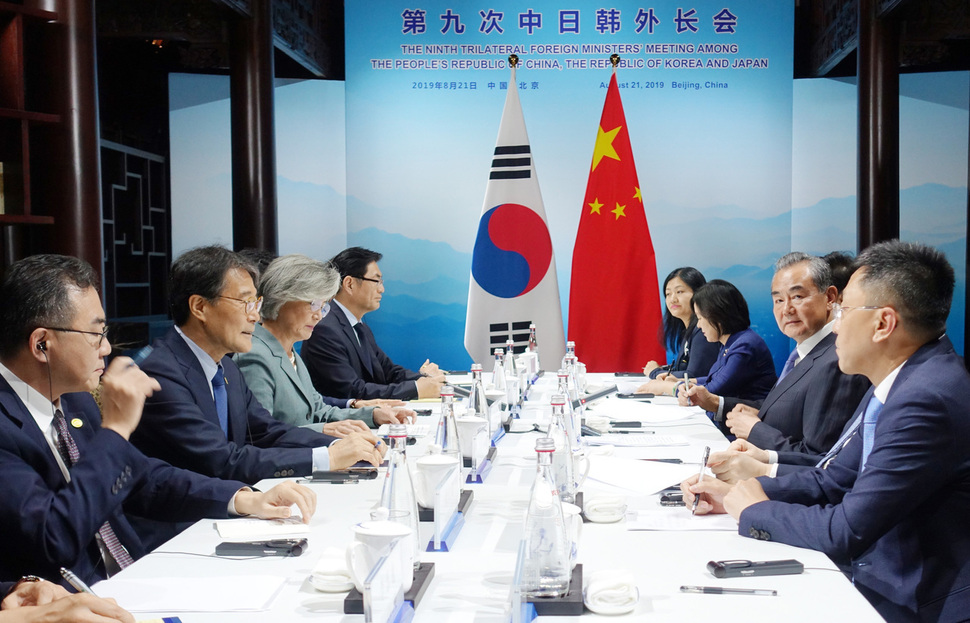Posted on : Aug.21,2019 17:31 KST
Modified on : Aug.21,2019 18:07 KST
 |
|
South Korean Foreign Minister Kang Kyung-wha meets with Chinese Foreign Minister Wang Yi China in Beijing on Aug. 20. (photo pool)
|
The top diplomats from South Korea and Japan will be meeting in Beijing on Aug. 21, their first meeting in 20 days since the ASEAN Regional Forum in Bangkok on Aug. 1. The meeting is attracting attention because it comes shortly before South Korea decides whether to remain in the General Security of Military Information Agreement (GSOMIA) on Aug. 24 and before Japan’s removal of South Korea from its white list of trusted trading parties goes into effect on Aug. 28. We hope this meeting will lead to a breakthrough in the South Korea-Japan conflict, which was triggered by Japanese measures taken in retaliation for a South Korean Supreme Court ruling about forced labor during the Japanese colonial occupation.
Since Japan imposed controls on exports of several key materials to South Korea on July 4, the two countries’ relationship has entered a downward spiral. The Japanese government pushed ahead with a cabinet decision on Aug. 2 to remove South Korea from its white list of countries that enjoy expedited screening for exports; the South Korean government countered on Aug. 12 by downgrading Japan to “Region A2,” further escalating the conflict. During that time, the two countries’ foreign ministers held one meeting and politicians from the ruling and opposition parties traveled to Japan for closed-door negotiations with Japanese politicians, but those efforts have failed to prevent a head-on conflict.
But we mustn’t sit idly by and watch the South Korea-Japan conflict unfold. If the two countries don’t stop staring each other down before long, it will surely place a greater burden on their economies, which are already struggling because of the trade war between the US and China. Recent statistics show that Japan’s exports in July declined 1.6% from the same period last year, with exports to South Korea dropping by 6.9%. South Korea’s exports were also down by 11% in July. While further analysis is needed to determine how much of the decline in exports can be attributed to the South Korea-Japan conflict, what’s clear is that the two countries’ dispute is multiplying the pressure they face amid a global economic slowdown.
During his commemorative address on Liberation Day, on Aug. 15, South Korean President Mon Jae-in held out an olive branch to Japan, remarking that “if Japan chooses the path of dialogue and cooperation, we will gladly join hands.” The Japanese government must respond enthusiastically. It’s encouraging that calls for reconciliation are being made in Japan, too. A few days ago, the Asahi Shimbun wrote that “President Moon’s Liberation Day address must be taken as an opportunity to bring an end to mutual retaliation and to move ahead with dialogue.”
But if the Japanese government nevertheless persists in rejecting dialogue, the South Korean government will surely face increasing pressure to withdraw from GSOMIA. We should take heed of the remarks by a Blue House official about the need to “take into consideration several matters” related to the agreement, “including Japan’s attitude and a quantitative and qualitative assessment of military intelligence.” This meeting is being held at a crucial time, and we hope that the two countries will find a way to resolve this issue.
Please direct comments or questions to [english@hani.co.kr]






